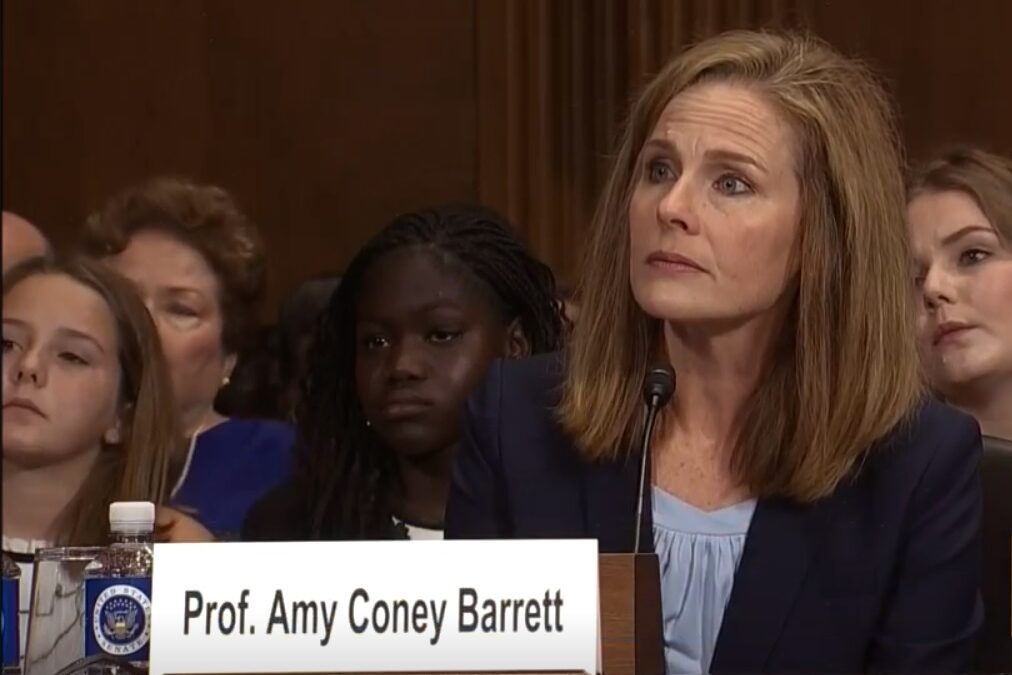The conflict over Amy Coney Barrett’s confirmation, behind which looms abortion rights and the legacy of Ruth Bader Ginsburg, is capturing the focus of the nation. But it will obscure more fundamental matters inextricably tied to debates about the value of human life, abortion, and the nature of future generations: Has the United States reached a place where its centuries-old institutions, like presidency and the Supreme Court, lost enough legitimacy to require revision? Can a handful of people really represent hundreds of millions of deeply diverse people — hundreds of millions more people than existed at the time institutions like the presidency and the Court were designed?
It seems odd to think that our future must rely upon the decision-making of a handful of individuals, while existential threats like the population-driven climate crisis and the new pandemics it will enable go largely unaddressed. If we care about our kids’ futures, we can’t leave those matters to a few people to decide.
It may seem fanciful to even raise these questions. It’s unlikely the nation will be convening a constitutional convention for the input of all on a new constitutional structure. Reenter the issues of Amy Coney Barrett’s confirmation and the legality of abortions. The reason a convention seems fanciful is that the nation contains so many people but almost no common core. Much like the population-driven climate crisis, our freedom is limited by one another.
But what if instead of thinking of the nation as having been constituted top-down by leaders in the past, we thought of the nation as “constituting,” dynamically, with the creation of children? That would be more consistent with the idea that government derives from the people. What if we took “We the People” in a literal and intergenerational sense, so that our being or becoming an inclusive, representative, legitimate, and self-determining people (arguably the cluster of core values behind the idea of the United States) depended on how we have and raise the next generations? How would our thinking change? Would we make lots of people irrespective of their personal development to grow the economy, or would we create fewer people in whom we’ve invested more?
If we thought in these terms, we could change who we are, as a nation engaged in a true form of federalism that limits and decentralizes power intergenerationally, without convening a constitutional convention at all.
Thinking in these terms suggests concrete outcomes.
The abortion debate would change, because we would have to account for abortion as more that just a means of facilitating women’s autonomy. We would have to also ask whether could ever possibly ensure kids a fair start in life without a women’s right to terminate her pregnancy. We would have to ask whether, without abortion, we could feasibly move toward the “smaller family “ ethic that has 20 times the mitigation impact on the climate crisis than other downstream options. We would have to ask whether we could possibly create a future of smaller democracies where each voice matters and whether without abortion we could possibly give kids a fair start in life, eliminating the unearned privileges of one’s birth position and the inequity that is tearing our democracy apart.
If we realized we were constituting, and not constituted in the past, our thinking would change.
Should measures like “baby bonds” be enhanced enough and pegged to family planning incentives as a means of leveling the playing field for all kids, perhaps using the privileged children of white families, or more specifically of pronatalists like Mitt Romney, as a benchmark?
Rather than being divided into left and right, such thinking might lead to a new and singular political border, and a spectrum between those seeking to constitute ourselves as free and equal people, free of the imposition of forms of human power like the climate crisis and possessed of truly equal opportunities in life, and preconstitutionals, and those like Trump and Matthew Yglesias, who sees future generations as fodder to grow the economy, other values aside.
If we still think we exercise our freedom by doing whatever we want, in terms of having large and unsustainable families and consuming all we can, we are learning nothing from the climate crisis and the way it will limit our and future generations’ freedoms. We will have learned nothing from the pandemic. Like refusal to wear a mask, things that seem freeing and individualized can at times be the opposite and can end by limiting the freedom of all.
Ruth Bader Ginsburg knew this, as was evident in her appreciation of the role of population growth in the things that threaten our future.
These are the issues that matter. If the Court’s power derives from the people, our focus must first be on the creation of children as free and equal people, or that which constantly reconstitutes us as a democracy. We have to see that as a process that overrides the Court’s authority — and end any deference to a handful of people who purport to decide the future of hundreds of millions of people to whom they have little, if any, connection. Our right to better family planning is the first human right. It overrides other matters and puts the function of democracy — to free us — above the archaic form of the Court.

